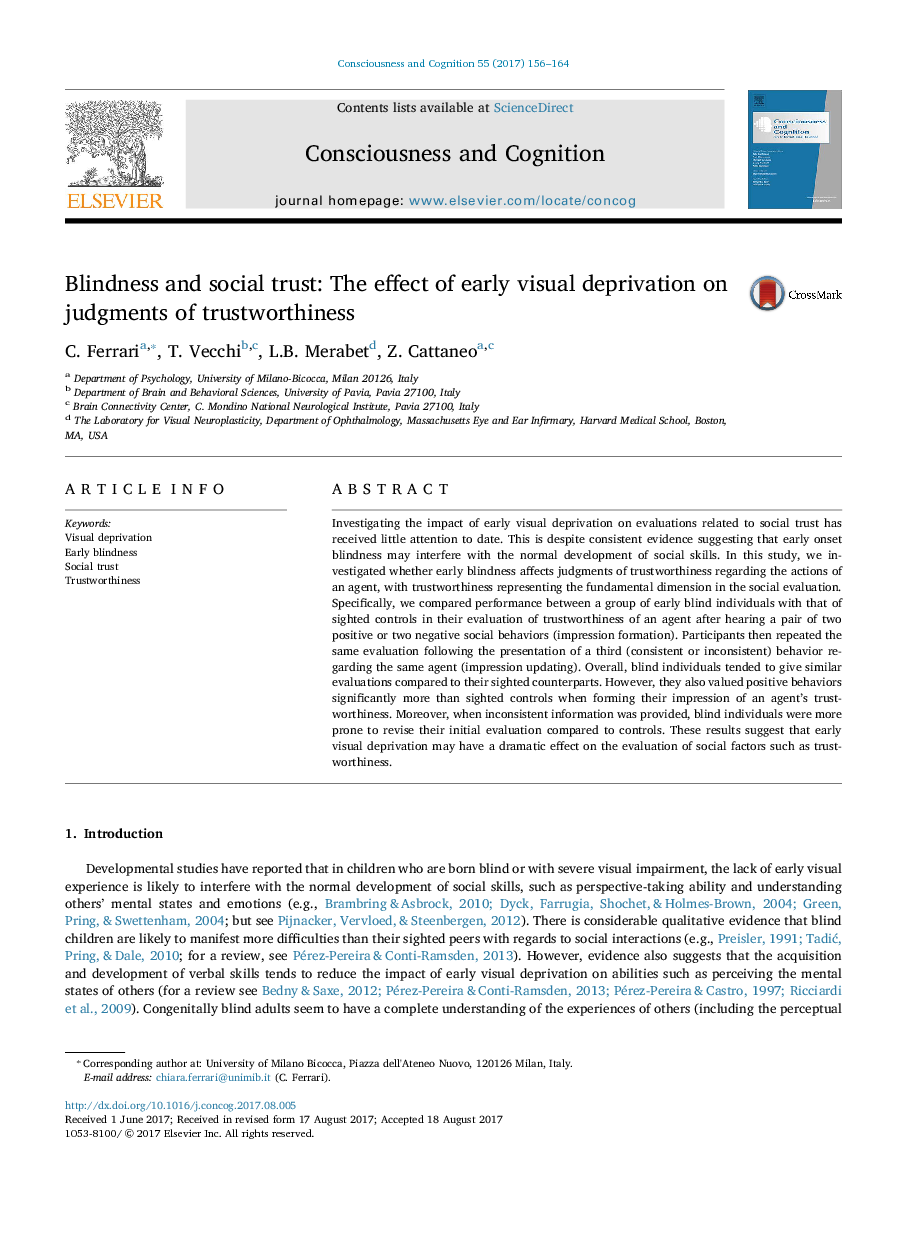ترجمه فارسی عنوان مقاله
نابینایی و اعتماد اجتماعی: تأثیر محرومیت زودرس فکری بر قضاوتهای اعتماد
عنوان انگلیسی
Blindness and social trust: The effect of early visual deprivation on judgments of trustworthiness
| کد مقاله | سال انتشار | تعداد صفحات مقاله انگلیسی |
|---|---|---|
| 130047 | 2017 | 9 صفحه PDF |
منبع

Publisher : Elsevier - Science Direct (الزویر - ساینس دایرکت)
Journal : Consciousness and Cognition, Volume 55, October 2017, Pages 156-164
ترجمه کلمات کلیدی
محرومیت ویژوال، کوری اولیه، اعتماد اجتماعی، امانت،
کلمات کلیدی انگلیسی
Visual deprivation; Early blindness; Social trust; Trustworthiness;
ترجمه چکیده
بررسی تاثیر محرومیت فوری فوری در ارزیابیهای مربوط به اعتماد اجتماعی، تا به امروز توجه کمتری را به خود جلب کرده است. این به رغم شواهد مستمری است که نشان می دهد که کوری های اولیه ممکن است با توسعه نرمال مهارت های اجتماعی مواجه شوند. در این مطالعه، ما بررسی کردیم که آیا کورسوری اولیه بر روی قضاوت های اعتماد به نفس در رابطه با اعمال یک عامل تأثیر می گذارد یا اینکه اعتماد به نفس نماینده بعد بنیادی در ارزیابی اجتماعی است. به طور خاص، عملکرد ما بین گروهی از افراد مبتلا به نابینایی با کنترلهای بینایی در ارزیابی اعتماد یک عامل پس از شنیدن یک جفت دو رفتار مثبت یا دو منفی اجتماعی (شکل گیری تصحیح) مقایسه شد. شرکت کنندگان پس از ارائه یک رفتار سوم (سازگار یا ناسازگار) در رابطه با عامل مشابه (به روز رسانی تصادفی) همان ارزشیابی را تکرار کردند. به طور کلی، افراد نابینا تمایل دارند ارزیابی های مشابه در مقایسه با همتایان دیدشان داشته باشند. با این حال، آنها نیز رفتارهای مثبت را در مقایسه با دیدگاه های خود نسبت به اعتماد به نفس آگاهانه، ارزش گذاری می کنند. علاوه بر این، هنگامی که اطلاعات متناقض ارائه شد، افراد نابینا بیشتر نسبت به ارزیابی اولیه خود در مقایسه با کنترل اقدام به تجدید نظر کردند. این نتایج نشان می دهد که محرومیت زودرس فوری ممکن است تاثیر قابل توجهی بر ارزیابی عوامل اجتماعی مانند اعتماد به نفس داشته باشد.

